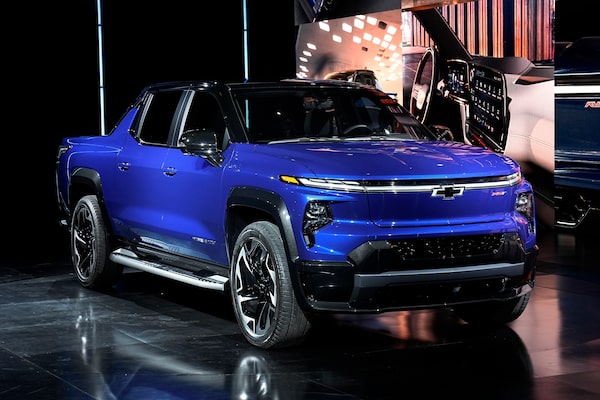
The 2024 Chevrolet Silverado EV RST, in Detroit, on Jan. 5, 2022.Paul Sancya/The Associated Press
The streets of Paris are full of electric bikes of every description. Three-wheeled cargo e-bikes deliver wine and bottled water to stores along dedicated bike lanes. Parents strap their kids to the front and back of e-bikes to take them to school. Tourists zip around town on rented e-bikes. Yes, there are electric cars, but they tend to be tiny, like the two-seat Citroen Ami, which can be driven by 14-year-olds.
Battery-powered small vehicles – bikes, cars classified as quadricycles and urban delivery vans – make enormous sense and Paris, which is opening bike lanes everywhere, is the better for it. What makes no sense is the North American approach, which is to stuff batteries with the weight of small cars in monster SUVs and call them “green” because they do not produce tailpipe emissions.
The global supply chains needed to produce these batteries are long, expensive, carbon intensive and sometimes replete with human-rights violations. Their excessive weight is wrecking roads and bridges and their sheer size and ability to accelerate as fast as a Porsche make them proven dangers to pedestrians. In regions where the electricity is generated by coal, oil and natural gas – burning hydrocarbons supplies the vast majority of the world’s electricity – plugging them in just transfers the pollution to the smokestack.
In one area of Montreal, bigger cars come with a higher price for parking
Enlightened governments are getting the message. We need a weight tax on vehicles, including one on electric vehicles (EVs), to encourage cars of all types to become lighter and less damaging to the environment, roads and pedestrians.
Norway, a pioneer in EV use, is considering a weight-based tax to steer buyers away from the fattest EVs (the Norwegian government recently eliminated EV purchase incentives). France already has one on SUVs. Buyers of new diesel and gasoline vehicles must pay a tax of €10 ($14.58) a kilo (2.2 pounds) above 1.8 tons. The weight threshold is to be reduced. EVs are exempt, but as those vehicles become heavier and more popular, it seems they will get swept into the weight-based tax net.
U.S. car makers are taking the bigger-is-better approach to EVs, as they do to all products they make.
According to a recent Atlantic magazine article about SUV obesity, the 2023 Ford F-150 truck (the Ford F-series have been the best-selling vehicles in the United States for decades) is 800 pounds (363 kilos) heavier than its 1990 version. So-called light trucks in general are about one-third heavier than they were 30 years ago.
The EV versions of these same machines are far heavier. The F-150 Lightning tips the scales at almost 3,000 kilos – a third more than its gasoline version. That’s because its underbelly is dominated by a battery that weighs more than 800 kilos, the weight of eight big men. The GMC Hummer’s EV version (price range US$99,000 to US$140,000, but, hey, you don’t have to pay for gas) is even more bloated. It weighs in at 4,100 kilos. Its battery weighs more than a Honda Civic.
Digging up the planet to provide the materials for such huge batteries rather negates their green image. Forests in the Democratic Republic of Congo and Indonesia are being eradicated to make way for mines, smelters, roads and ports to get cobalt and nickel to battery factories.
But they inflict damage in the markets where they are bought, too. Because of its extra weight, an EV is twice as likely to grind down roads than its gasoline or diesel counterpart, according to various studies. Structural engineers have warned that some multistorey parking garages would be in danger of collapse were they to be filled with EVs. In April, a carpark in Lower Manhattan collapsed, killing one person. The climbing weight of SUVs is thought to have contributed to the building’s instability.
Pollution from excessive tire wear is another problem. Since EVs are heavier, and their electric motors produce more torque (twisting force) that regular cars, they burn through tires far faster than regular cars. The particulates from the tires contain rubber, microplastics and volatile organic compounds, which are dangerous to human health, soil and waterways. An organic compound called 6PPD, which is used to help prevent tires from cracking, is water soluble and has been linked to mass fish die-offs.
In North America, vehicles are getting bigger every year and EV versions of those same machines will make them obscene rolling fatsos. U.S. President Joe Biden’s Inflation Reduction Act offers a tax credit of up to US$7,500 for EVs. This is so wrong on so many levels. Why not implement a tax that would hit all heavyweight vehicles, including EVs, and use the money to subsidize small urban EVs and electric bikes? If the idea is to go gentle on the environment, a four-ton EV makes no sense. Electric bikes are city savers. Paris gets it; Detroit does not.
 Eric Reguly
Eric Reguly